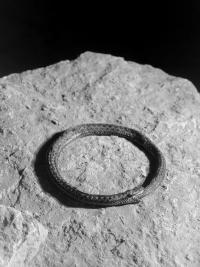Subscribe to the Newsletter
Your cart is empty
Shop now



































In Praise of Shadow
"Can the darkness be embraced? In his book "Dark Ecology," Timothy Morton proposes that we settle in the darkness. lt'ss deemed the only way out of the catastrophic vision of the Anthropocene, and one that gives hope for a new world to be built.
Artist Tomasz Kawecki, placing a snake devouring its tail - the Ouroboros - at the beginning of his book, follows Morton's thought and invites us to enter the darkness. According to Morton, the Ouroboros is a symbol of the individual's entanglement with the strange, repulsive, and monstrous. lt heralds the return of the specters long banished from the world we managed to tame. Suppressed content creeps in like weeds breaking through asphalt. The more we pull out and spray those plants we consider intrusive, the stronger they grow, becoming completely resistant to uninhabitable conditions.
What we see in the darkness violates our vision of a harmonious, pristine nature. Deep underground is where mucus-covered monsters live. They dwell in black, contaminated water. Slowly, we immerse in it ourselves, losing our footing and letting the poison carry us away.
lt is by no means coincidental that the project In Praise of Shadow was created during the artist's residency in Nowa Ruda, the most polluted city in Poland. The cool landscape intertwines the bodies of humans and non-humans. In the smog, organisms intermingle, losing their contours. Excessive human interference with the Earth has awakened a demon. We process the remains of plants and animals, manufacturing poisonous energy. We then use it to heat our bodies and power machines. Although the planet's resources seem endless, we are only just realising how high the price we are due to pay is.
At the bottom of the black water lie cool, oil, bones, plastic particles, and detritus. At the bottom of the black water, fungi and lichens grow. We drift in it; it has become too thick to move in.
Kawecki leads the audience through stages of initiation into ecognosis. We pass through abandoned houses and mines, observing new life as it regains its autonomy, completely independent of human activity. Such places arouse unease in people. Here, human rules do not apply, nor do religious dogmas, economic, or political systems exist. Reason is also of no use. From the darkness emerge Lovecraftian hybrids that we have bred. We must now find them a place in our civilised world. We must drink the black water."
Words by Aleksandra Przybysz
Tomasz Kawecki is part of Issue 17 by Guest Editor Torbjørn Rødland.